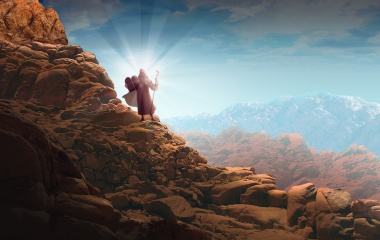
Why did Moshe break the luchot habreet, the tablets of testimony, that were written by G-d himself? While one might be tempted to answer that it was due to the Jewish people building and worshiping a golden calf, a close reading of the text leads one to take a slightly different approach.
"G-d declared to Moses, go down, for the people whom you brought out of Egypt have become corrupt. They have made themselves a cast - metal calf" (Shemot 32:7-8). Forty days after Sinai the same Jews who trembled in the presence of the Divine violate the second commandment as they build an image of G-d. One might have expected Moshe to break the tablets right then and there and take G-d's advice to let Him "unleash my wrath against them to destroy them. I will make you into a great nation" (Shemot 32:9). Yet Moshe not only holds onto the tablets, he actually begins "to plead before G-d his Lord". A plea for mercy, the covenant with our forefathers, the sanctification of G-d's name are all arguments Moshe puts forth. He is so convincing that "G-d refrained from doing the evil that He planned for his people" (Shemot 32:14). Moshe clearly still planned to give the tablets to this nation that "have been quick to leave the way that I ordered them to follow."
The luchot were thus fully intact as "Moshe turned and went down from the mountain" relieved that he had managed to stave off punishment for his beloved nation. Yet a few verses later we read how "Moshe displayed anger, and threw down the tablets that were in his hand, shattering them at the foot of the mountain" (Shemot 32:19). What happened in the interim?
"And he approached the camp and saw the calf and the dancing" (Shemot 32:19). Knowing that the calf was built, did not seem to set off his fury. Rather his anger seems to have been kindled by the "dancing", dancing that continued even in the presence of Moshe and the Tablets. It is one thing to sin, it is quite another to continue sinning and rejoicing in the presence of the true lawgiver.
Furthermore, and perhaps decisively, the excuse for building a calf was no longer valid and yet there was no remorse on the part of the Jewish people. "When the people saw that Moses was not coming down the mountain, they gathered around Aharon and said to him make us a god to lead us. We have no idea what happened to Moshe, the man who brought us out of Egypt" (Shemot 32:1-2). Their indiscretion was due to the need for a tangible leader, as these recent slaves could not yet understand the concept of an abstract G-d. Yet when Moshe came back, instead of relief and joy at seeing him, and more importantly the realization of their error, the Jewish people shamelessly continued dancing. What was their excuse now? How dare they continue as if nothing had happened! Sadly, Moshe had to take the calf himself and destroy it, an action that should have been done by the Jewish people themselves. With no remorse shown and the dancing continuing it is no wonder Moshe angrily broke the luchot.
Each and every one of us sins on a regular basis. While for many of our sins the excuses are lame, for others explanations, even good ones, abound. After all, we are too busy to learn on a regular basis, our kids keep us awake at night preventing us from going to morning minyan, the cost of day school education restricts our ability to give tzedakah, the competition to climb the corporate ladder forces us to step on the toes of others. We can understand and to a certain extent excuse those "sins".
But what happens when our kids are older, our financial and time constraints lessened? Do we all of a sudden pay more attention to our spiritual growth? Do we spend more time volunteering for the community or helping others? Bad habits have a way of continuing in all spheres of life. Change requires much work. Even if we mistakenly feel that change is too hard we must at least stop the dancing and we must regret sinning. Let us at least recognize that Moshe is back, that we can change our ways if we truly desire to do so. If we do so we will succeed in strengthening our covenant with G-d.



